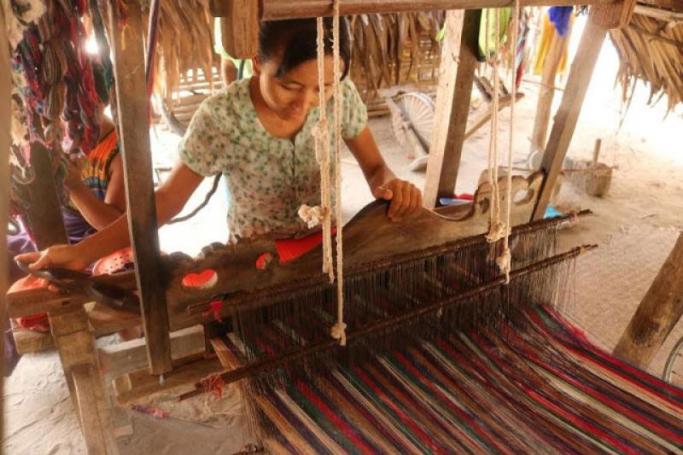The low-level hum of weaving machines and conversation fill the house in Chai village, a rural community in Magwe Region’s Pakokku Township in central Myanmar.
Inside, 35-year-old Ma Tu moves her hands and legs skillfully as she weaves threads through a loom, creating handcrafted traditional clothes.
The mother of two sells assorted fried snacks in the early hours of the morning, and shifts to weaving for the rest of the day to boost her income.
“In the past, I earned about 30,000 kyats (US$23) each month. However, my monthly income has increased to 100,000 kyats ($75) from both jobs,” she said in an interview in mid-May.
With help from NGOs in the area, sellers of traditional, handcrafted clothing are breaking into a market flooded by cheap imports from abroad.
Training and expansion
Women in Bagan, Nyaung Oo, Pakokku and Myine townships are at the forefront of the effort, while international non-profit ActionAid has conducted training courses for 2,500 locals from 134 villages since 2013.
The organization helps locate raw materials for the goods and find markets for them, said May Thinzar Kyaw Soe, coordinator of the Socio-Economic Development Network project under ActionAid.
The finished clothes are popular among tourists and other visitors, May Thinzar Kyaw Soe said, and there is the added benefit of not losing touch with tradition.
As part of the project, the Women Producers Support Group (WPSG) was formed in 2013 with 700 members. In 2016, the trade association helped local residents in the townships earn a total of 70 million kyats ($52,000), May Thinzar Kyaw Soe added.
Despite the lag in tourism around the 2015 election period and issues stemming from flooding, the Socio-Economic Development Network (SEDN) project implemented by ActionAid in Nyaung Oo near Bagan increased sales by 21 per cent in 2015, according to an annual report.
A second phase of the project aims to provide women with a referral system for essential services that they could not previously access, such as childcare, legal assistance or advice on how to register for an identity card.
Under the project, a handicraft shop known as M-Boutik opened in Nyaung Oo Township, hoping to attract visitors coming to see Myanmar’s famed Bagan temples and pagodas.
The crafts are now sold at hotels and other shops in Yangon, Mandalay and Nyaung Shwe, home to Inle Lake, another tourist draw.
They include pillow and cushion cases, clothes and bags. M-Boutik collects 60 percent advance payment from buyers for the total value of goods before transferring the orders to producers.
The first phase of SEDN projects started in 2013 and terminated last year, but it has been extended another three years until 2019. After that, the SEDN is scheduled to hand over the business, including M Boutik, to WPSG, the women’s trade group. ActionAid, however, will continue offering training on manufacturing.
Htay Kywe, a resident of Myine Township, had worked in making palm sugar, collecting firewood and weeding. She earned about 600 kyats ($0.45) each day at the time. But from sewing she makes about 4,000 kyats ($3).
“I do not need to worry about making a living any more,” she said.
In the past most of the young people in her village moved to major cities for work, such as Yangon and Mandalay. Others went farther afield to China.
But the new opportunities in the cottage industry have slowed some of the migration.
“Both male and female adults had to find jobs in other areas. This situation does not happen any more right now,” Htay Kywe said.
Difficulties and expectations
But there are still problems.
Completing one unit of sarong is time-consuming, which squeezes potential returns on daily earnings. Moreover, there is not enough investment for mass production.
Maw Maw Lwin, Chairwoman of the WPSG, said they need more space and equipment to be able to manufacture a larger stock, and they need to develop better teamwork in the production process.
Still, the bump in income and the potential to expand help maintain morale.
“We are not confident to find markets by ourselves without help from ActionAid. But we want to try it. Some potential clients from Yangon contact us to purchase our products. We are discussing it with the SEDN,” said Maw Maw Lwin.
But the gains from weaving are already changing lives for the better.
Ma Tu, the seller from Pakokku Township, said her increased monthly income has helped provide for her family and made it easier to put away some savings.
“Before our family could buy enough rice for only one or two days. Now we can purchase the rice in bag that is enough for a month,” she said.
Courtesy Myanmar Now
You are viewing the old site.
Please update your bookmark to https://eng.mizzima.com.
Mizzima Weekly Magazine Issue...
14 December 2023
Spring Revolution Daily News f...
13 December 2023
New UK Burma sanctions welcome...
13 December 2023
Spring Revolution Daily News f...
12 December 2023
Spring Revolution Daily News f...
11 December 2023
Spring Revolution Daily News f...
08 December 2023
Spring Revolution Daily News f...
07 December 2023
Diaspora journalists increasin...
07 December 2023
Euromoney Myanmar Global Investment Forum begins in Nay Pyi Taw












